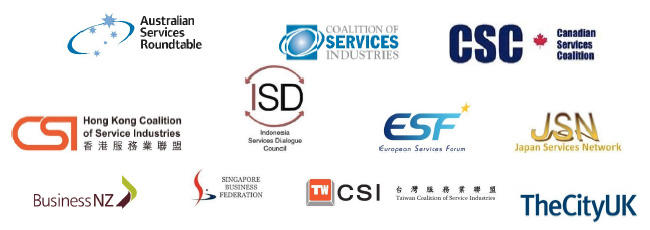
Global Services Coalition (GSC) Statement on
WTO E-Commerce Negotiations and WTO E-Commerce Moratorium
October 8, 2019, Geneva - The Global Services Coalition (GSC) speaks for the services sector in its members' respective countries on matters of international trade and investment and represents their industries internationally. Services now accounts for half of global trade on a value-added basis and is growing while merchandise trade is decreasing. Much of the current and future growth of services trade is tied to the growth of digital trade and the rise in digitally enabled services. At the same time, trade restrictive measures, particularly in digital trade, are growing.
To ensure that the services and digital trade continue to expand and fuel our economies and employment, we must have multilateral digital rules of the road and a strong, revitalized WTO to enforce them. To achieve that end, the GSC urges WTO members to intensify negotiations to create a high standard e-commerce agreement. To set a high standard for digital trade rules we believe a WTO E-Commerce Agreement should include, among other elements: facilitation of cross border data flows and fostering e-commerce enabling services, prohibition of forced data localization in all service sectors, a permanent moratorium on e-commerce duties, prohibition of disclosure or transfer of source code or algorithms, trade facilitation provisions, promotion of risk-based cybersecurity measures; and negotiation of services market access commitments for e-commerce related services.
This list is not exhaustive and merely highlights some of the key elements that GSC members urge be included in an e-commerce agreement. These rules must also allow for data-security and appropriate and effective protection of personal data and must be assured through compliance with local privacy and security regulations. Any exceptions to the principles promoting cross-border data flow and prohibiting forced localization should be limited to legitimate public policy objectives and only in full compliance with the provisions of GATS Articles XIV and XIV bis and provide equal treatment to local and foreign services providers.
In addition to the ongoing e-commerce negotiations, GSC members also place a high priority on continuation of the WTO E-Commerce Moratorium banning custom duties on electronic transmissions. The moratorium has become a critical part of the global foundation of the digital economy and is a shining example of how the multilateral system can promote policies that foster innovation and growth, particularly for small and medium size enterprises. GSC members believe that the moratorium should not expire at the end of this year and be made permanent.

